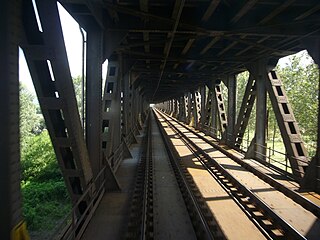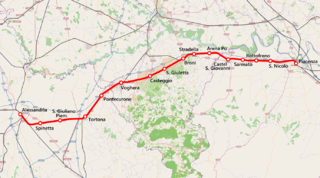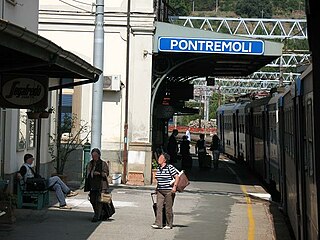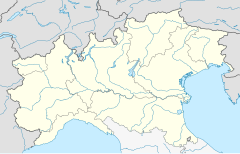
The Turin–Milan railway is a major Italian railway that links the cities of Turin and Milan. The railway is double track, standard gauge and fully electrified at 3 kV DC. It connects the cities of Settimo Torinese, Chivasso, Santhià, Vercelli, Novara, Magenta and Rho. Since February 2006 high-speed trains have operated over the Turin–Milan high-speed line between Turin and Novara. The remainder of the high-speed line between Novara and Milan was opened in December 2009, when the Bologna–Florence high-speed line and the remaining sections of the Rome–Naples high-speed railway line and the Naples–Salerno high-speed line are opened, completing the high-speed network between Turin and Salerno.

The Genoa–Milan railway is a major Italian rail line, connecting the cities of Genoa and Milan. It is 157 km (98 mi) long and fully electrified at 3,000 V DC. Passenger traffic is managed by Trenitalia.

Genova Sampierdarena railway station is located in Piazza Montano, in the Sampierdarena district of Genoa, Italy. It is Genoa's third most important railway station, after Genova Piazza Principe and Genova Brignole.

Asti railway station serves the city and comune of Asti, in the Piedmont region, of northwestern Italy. Opened in 1849, the station forms part of the Turin–Genoa and Castagnole–Asti–Mortara railways, and is also a junction for two other lines, to Genoa and Chivasso.

Alessandria railway station serves the city and comune of Alessandria, in the Piedmont region, northwestern Italy. Opened in 1850, it forms part of the Turin–Genoa railway, and is also a junction for six other lines, to Chivasso, Piacenza, Novara, Pavia, Cavallermaggiore, Ovada and San Giuseppe di Cairo.

Chivasso railway station serves the town and comune of Chivasso, in the Piedmont region of northwestern Italy. Opened in 1856, it forms part of the Turin–Milan railway, and is also a junction for three other lines, to Aosta, Asti and Alessandria.

Torino Lingotto railway station is one of the main stations serving the city and comune of Turin, capital of the region of Piedmont, northwestern Italy. The Torino Lingotto metro station is located nearby, and opened on March 6, 2011.
The Rome–Ancona railway is a rail line in central Italy connecting the city of Ancona with Orte, and therefore with the capital city, Rome. The line crosses the Apennine Mountains from the Adriatic Sea to the Tyrrhenian Sea, passing through Foligno, Spoleto, and Terni.

The Adriatic railway is the railway from Ancona to Lecce that runs along the Adriatic Coast of Italy, following it almost all of the way. It is one of the main lines of the Italian rail system and links the northern cities with the most important productive areas of central and southern Italy.

The Pavia–Alessandria railway is a railway line in Italy.

The Alessandria–Novara–Arona railway is a railway line in Italy that connects Alessandria to Arona on Lake Maggiore, passing through Novara.

The Bologna–Ancona railway is an Italian railway that connects the city of Bologna with the city of Ancona, passing through the Po Valley to Rimini and along the Adriatic coast for the rest of the line.

The Biella–Novara railway is a regional railway line of Piedmont in Italy, that connects Biella to Novara railway node for Milan and Alessandria, serving some countries of the province of Vercelli and Novara.

The Alessandria–Piacenza railway is a railway located in northern Italy connecting the regions of Emilia-Romagna, Lombardy, and Piedmont. The railway is 96 kilometres (60 mi) long and it is managed by RFI. It links the rail hub of Alessandria with that of Piacenza, passing through the cities of Tortona, Voghera, and Stradella.

The Padua–Bologna railway is an important railway line in Italy that joins the city of Padua to Bologna, passing through Rovigo and Ferrara. The infrastructure is managed by RFI, which classifies it as a primary line.

The Treviglio–Bergamo railway is a railway line in Lombardy, Italy. The railway infrastructure is managed by the Rete Ferroviaria Italiana, which classifies it as one of its complementary lines. The passenger service is operated by Trenord as a regional service.

Pontremoli railway station is a station that serves the Italian town of Pontremoli and the municipalities of the upper Lunigiana, Zeri, Mulazzo and Filattiera. It is located on the Parma–La Spezia railway.

The Venice–Udine railway is an Italian railway line connecting Venice, in Veneto, with Udine, in Friuli-Venezia Giulia. It follows the same route as state highway 13.

The Udine–Trieste railway is an Italian state railway line that connects Udine and Trieste running through the central and eastern part of Friuli-Venezia Giulia.

The Lucca-Aulla railway also known as the Garfagnana railway is an Italian railway branch line. Running from the city of Lucca the line crosses the Garfagnana and Lunigiana regions to join the Parma–La Spezia railway in Aulla.
























